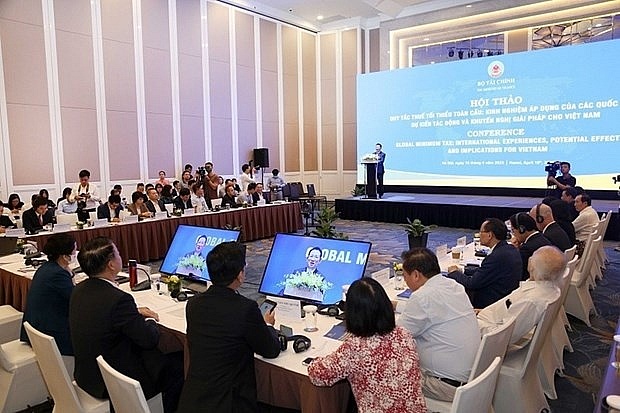Experts scrutinise global minimum tax implementation in Vietnam
 |
| Overview of the conference (Photo source: qdnd.vn) |
Hanoi – Vietnam needs to fully and comprehensively assess the impacts of the global minimum tax on the country, said Minister of Finance Ho Duc Phoc on April 18.
Speaking at a conference “Global minimum tax: International experiences, potential effects and implications for Vietnam” held in Hanoi, Phoc said that as many of 1,015 foreign-invested enterprises in Vietnam whose parent companies are subject to the global minimum tax and more than 70 businesses are likely to be affected by the global minimum tax when it is applied from next year.
If the countries home to the parent companies enforce the global minimum tax, they will collect additionally about over 12 trillion VND (510.5 million USD) in tax in 2024.
Imposing global minimum tax means that Vietnam’s tax incentives will not have much effect in attracting foreign investors, which can pose a significant challenge to maintaining the competitiveness of Vietnam's investment environment, the minister said.
To date, most EU countries, Switzerland, the UK, the Republic of Korea (RoK), Japan, Singapore, Indonesia, Hong Kong (China), and Australia have confirmed that they will apply the minimum tax rate of 15% from 2024.
Of them, the RoK, Singapore, and Japan have large investments in Vietnam and many businesses that are subject to the global minimum tax.
Dang Ngoc Minh, Deputy Director of the General Department of Taxation, said that in Vietnam, about 335 projects with registered investment capital of over 100 million USD in manufacturing and processing industries are enjoying corporate income tax incentives with rates of lower than 15%, particularly those in the hi-tech sector such as Samsung, Intel, LG, Bosch, Sharp, Panasonic, Foxconn, and Pegatron.
The total registered investment capital of those projects accounts for nearly 30% of the total FDI in Vietnam, about 131.3 billion USD.
Therefore, when Vietnam applies this tax without timely responses, Vietnam can lose its competitive advantages in foreign investment attraction, while foreign investors' investment expansion plans will be affected too.
Minh said that if Vietnam does not apply the global minimum tax, the state budget revenue from corporate income tax will not be affected.
However, if Vietnam applies the standard domestic minimum tax, Vietnam will have the right to levy additional taxes on FDI enterprises that are enjoying lower tax rates in Vietnam, thereby having state budget revenue increased.
In case Vietnam does not collect additional corporate income tax, the entire amount of tax incentives for existing businesses will be collected by the countries which are home to the parent companies.
Robert King, Deputy General Director of Ernst & Young Vietnam, recommended that the policy problem for Vietnam at this time is to achieve two important goals - proactively gaining the right to tax and continuing to create favourable investment environment.
He suggested that Vietnam apply a standard domestic minimum tax. In addition, the Government should have policies to support investors to increase competitiveness of not only those affected by the implementation of the global minimum tax rate but others.
 | Global Minimum Tax a head-scratcher for Vietnamese policymakers As many countries plan to adopt the Global Minimum Tax Rate (GMTR) in 2024, experts are concerned that the entry into force of the rate would discourage foreign companies from locating their operations in low-tax countries. |
 | Vietnam must revisit policies to develop implementation of global minimum tax Countries that have outbound and inbound investment activities have been making drastic moves in considering policies related to the global minimum tax (GMT). If Vietnam does not take immediate action or delays implementing it, it may miss the opportunity to have the right to tax and may be left behind in attracting foreign investment. |
 | Vietnam adjusting policies to adapt to global minimum corporate income tax: Official Vietnam is studying and adjusting its investment policies to adapt to the global minimum corporate income tax which is scheduled to be applied from 2024, said Deputy Minister of Planning and Investment Nguyen Thi Bich Ngoc. |
What the stars mean:
★ Poor ★ ★ Promising ★★★ Good ★★★★ Very good ★★★★★ Exceptional
Related Contents
Latest News
More News
- Masan Consumer names new deputy CEO to drive foods and beverages growth (February 23, 2026 | 20:52)
- Myriad risks ahead, but ones Vietnam can confront (February 20, 2026 | 15:02)
- Vietnam making the leap into AI and semiconductors (February 20, 2026 | 09:37)
- Funding must be activated for semiconductor success (February 20, 2026 | 09:20)
- Resilience as new benchmark for smarter infrastructure (February 19, 2026 | 20:35)
- A golden time to shine within ASEAN (February 19, 2026 | 20:22)
- Vietnam’s pivotal year for advancing sustainability (February 19, 2026 | 08:44)
- Strengthening the core role of industry and trade (February 19, 2026 | 08:35)
- Future orientations for healthcare improvements (February 19, 2026 | 08:29)
- Infrastructure orientations suitable for a new chapter (February 19, 2026 | 08:15)

 Tag:
Tag:



















 Mobile Version
Mobile Version